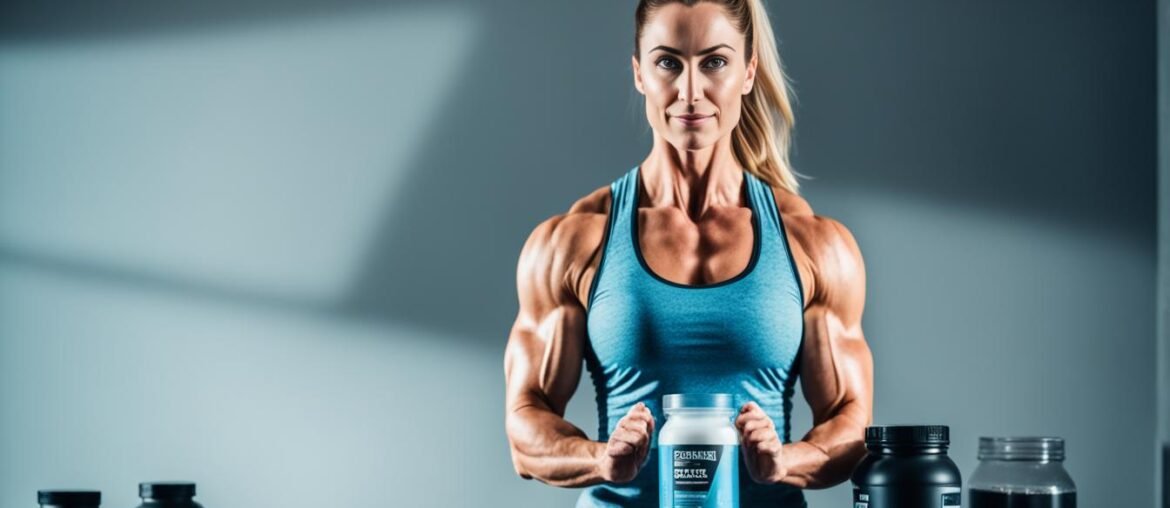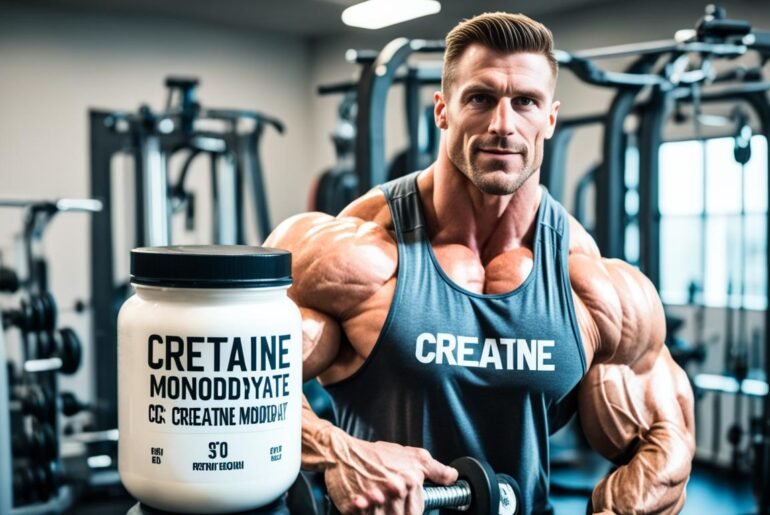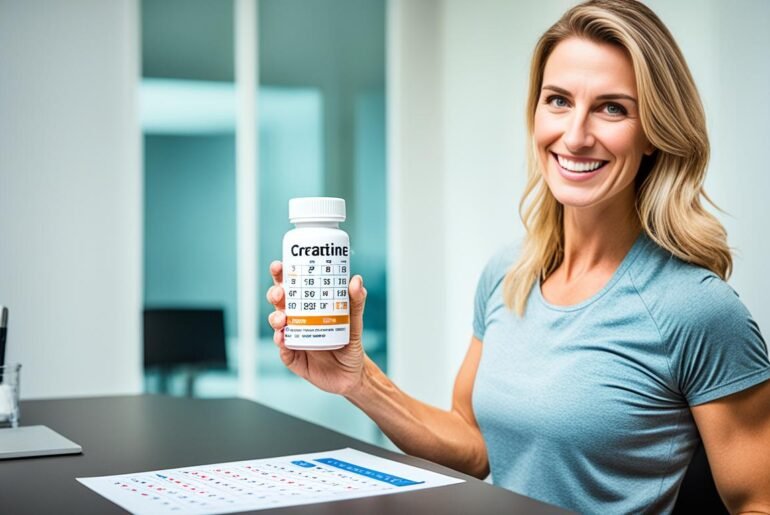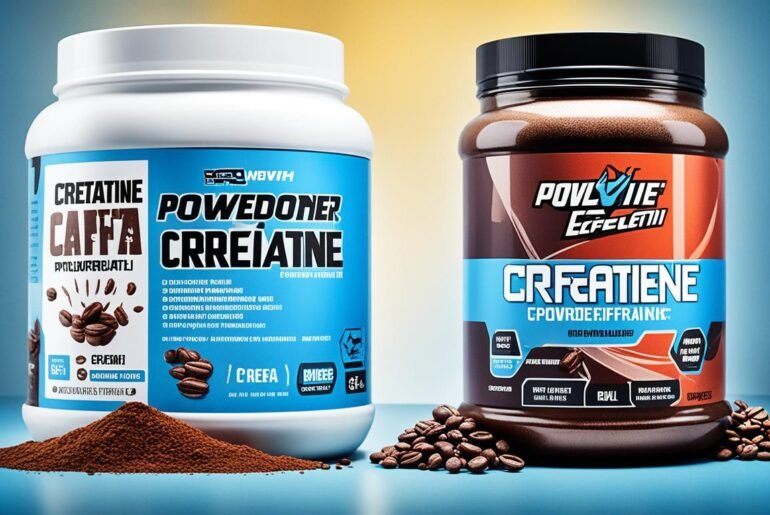Forget the dated images of creatine being the preserve of hulking male bodybuilders—one in every three women actively engaged in high-intensity workouts such as strength training is likely to include creatine in her fitness routine. In an industry where **Female Fitness** is often synonymized with yoga mats and pastel dumbbells, **Creatine for Women** reveals a groundbreaking shift. Women are not just participating but excelling in disciplines that demand peak physical performance, with **Weightlifting for Women** showing remarkable growth. As a dedicated follower of **Women’s Strength Training**, I’ve watched creatine emerge as an unexpected but powerful ally for women pursuing lean muscle growth without unwanted bulk.
Classified as an amino acid and naturally stored in the muscles and brain, creatine converts into an energy powerhouse during high-octane activities. Whether it’s a set of deadlifts or a circuit of high-intensity interval training, the role of creatine in a woman’s diet is irrefutable. And for those who might question its relevance in a vegetarian or vegan lifestyle, foods such as red meat and fish might be common creatine carriers, but the powder supplement form ensures everyone gets their fair share of this workout-enhancing nutrient.
Key Takeaways
- Creatine is increasingly popular among women engaged in high-intensity workouts and strength training.
- It supports energy production during short bursts of intense exercise such as sprints or heavy lifting.
- Supplemental creatine boosts muscle growth and performance without the bulk traditionally linked to men’s bodybuilding.
- Vegetarians and vegans, who may have lower natural creatine levels, can particularly benefit from supplements.
- Integrating creatine has been shown to have mental and physical performance benefits, vital for rigorous training sessions.
Understanding Creatine: An Overview for Female Athletes
As female athletes continue to break barriers in the world of weightlifting, understanding the role of supplements becomes increasingly important. Creatine, a naturally occurring compound in the human body, provides substantial benefits, especially in the realm of weightlifting and high-intensity training. Let’s explore creatine’s impact on muscle building and why it holds a significant role in women’s weightlifting supplements.
What is Creatine, and Why is it Relevant to Weightlifting?
Creatine is a substance that the body utilizes to produce energy quickly. During weightlifting, our muscles rely on this rapid energy source to perform lifts and handle more significant strain. My experience has taught me that the right creatine dosage for females can make a noticeable difference in strength and endurance. This is backed by numerous studies showing that with creatine benefits, women can potentially enhance their muscle building efforts and withstand longer, more challenging workouts.
Natural Sources of Creatine and Why Supplements Matter
The body synthesizes creatine naturally, and it can be found in foods like fish and organ meats. However, for those of us maintaining plant-based diets or seeking an extra edge, supplementation is key. High-quality creatine supplements ensure that we maintain optimal creatine levels, which can be particularly challenging for women who are serious about their weightlifting regimen. Understanding the value of supplements, I integrate them carefully into my diet to support my training and ensure my body is primed for muscle building.
To conclude, the synthesis of creatine within our muscles is critical during those intense lifting sessions, and as women focusing on improving our strength without the bulk, it’s clear that creatine is more than just a men’s supplement. Its importance in weightlifting is undeniable, making it a cornerstone in women’s weightlifting supplements.
Demystifying Creatine for Women in Weightlifting
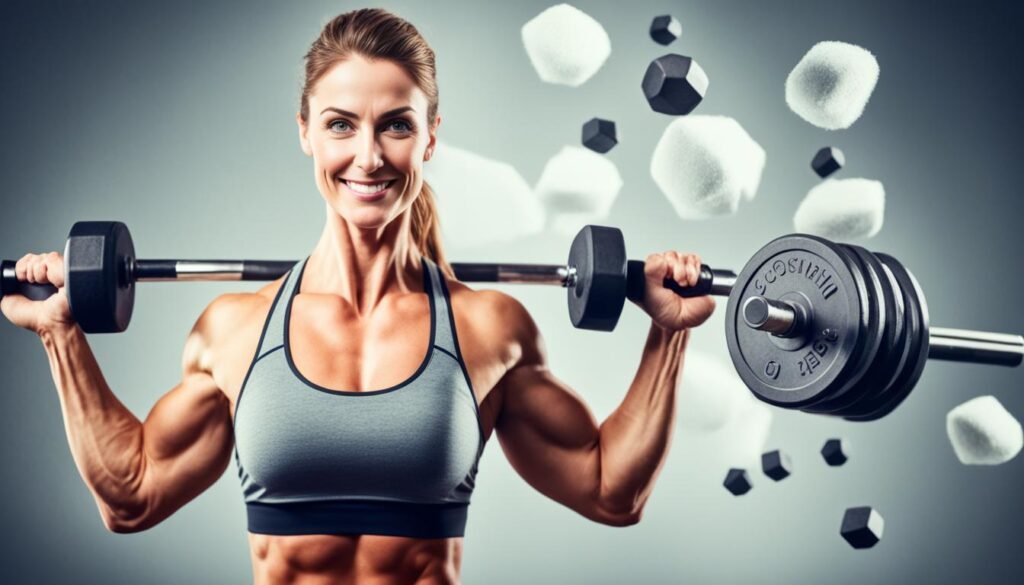
When it comes to female fitness and strength training, there’s no shortage of confusion surrounding the use of supplements like creatine. Despite the pervasive myths that suggest creatine is solely for men looking to “bulk up,” creatine for women offers an array of benefits that can transform their workout experiences.
One of the common fallacies is that creatine supplementation leads to unwanted mass gain in women’s fitness regimens. However, the truth shines through scientific scrutiny – creatine supports muscle gain while contributing negligibly to fat stores. It also ignites a flame in workout performance, pushing you to act with more vigor, making those intensive training sessions count without the dreaded spike in fat levels.
The concerns about creatine causing water retention are not entirely misplaced, but this is frequently a temporary effect. While the muscles may hold more water initially, this often correlates with increased muscular strength and endurance, owing to creatine’s influential role in energy production during high-intensity activities.
For women who aren’t regular gym-goers, there’s still good news. Creatine, which doesn’t contain calories, can be effortlessly incorporated into a diet, particularly for those on a vegetarian or vegan regimen where it’s typically less abundant.
Let’s cast a light on the relationship between women’s strength training and creatine with the following facts:
- Creatine can assist in elevating muscle mass and strength without corresponding fat gain.
- It can enhance the intensity of workouts, allowing for longer and more effective sessions.
- Any initial increase in water weight is usually offset by the improved workout performance creatine instigates.
- For those not working out, creatine still plays a vital role due to its presence in everyday food items and its non-caloric nature.
Given these insights into creatine for women, it’s imperative to recognize its true potential beyond the realms of male bodybuilding, acknowledging its significant role in the empowerment of female athletes and fitness enthusiasts alike.
Surprising Benefits of Creatine in Women’s Fitness
As the fitness landscape evolves, so do the resources available to enhance performance and achieve personal milestones. Among the plethora of supplements gracing the shelves, creatine has emerged as a remarkable ally for women in fitness, particularly those dedicated to muscle building and strength training. Its benefits extend far beyond the typical stereotype of bulking, presenting a suite of advantages that align well with the goals of female athletes.
Lean Muscle Growth Without the Bulk
Breaking the mold of misconceptions, creatine catalyzes the development of lean muscle mass without contributing to the undesired bulk that many women wish to avoid. The synergy between a balanced diet, meticulous workout plans, and the judicious use of women’s weightlifting supplements can lead to a physique that embodies strength and definition, courtesy of creatine’s role in muscle synthesis.
How Creatine Fuels Workouts for Greater Endurance
Endurance is paramount in any fitness routine, and creatine is a pivotal component in ensuring that stamina does not wane during those critical moments of a workout. By enhancing energy production at the cellular level, creatine allows women to push through rigorous high-intensity intervals, lifting sessions, and endurance training, marking it as a cornerstone among muscle building supplements.
Understanding the Cognitive Advantages of Creatine
Often overlooked are the cognitive benefits that creatine provides. Mental clarity and quick cognitive responses are essential, particularly when engaging in complex movement patterns and challenging fitness regimens. By supporting brain health and function, creatine not only fosters a stronger body but also fortifies the mind, making for a well-rounded approach to women’s health and fitness achievements.
Optimal Creatine Dosage for Effective Female Training
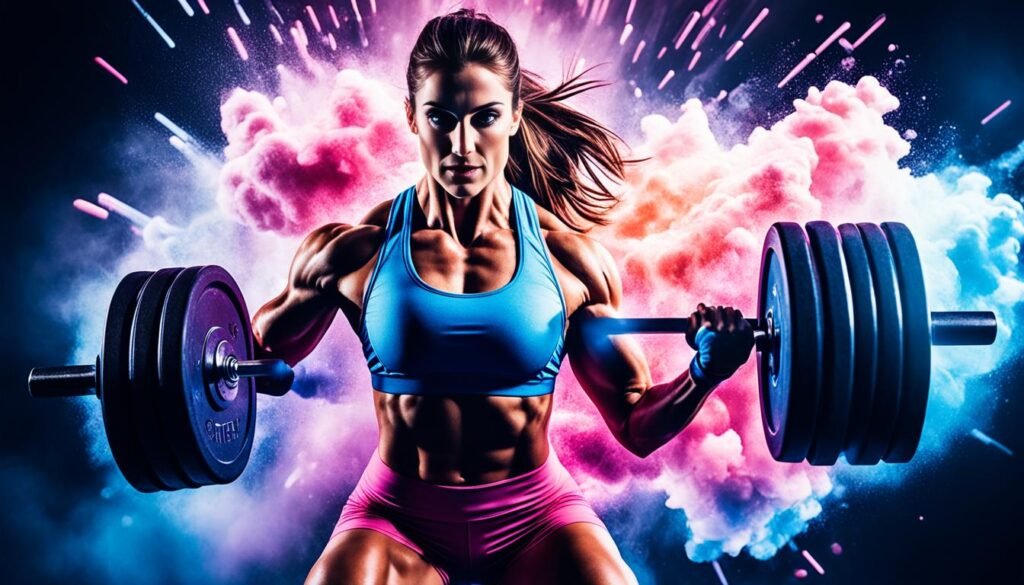
When it comes to Women’s Fitness and Creatine, I’ve discovered that the optimal dosage can significantly influence the outcome of one’s training regimen. Regarding Creatine Dosage for Females, various studies suggest that a starting point of 5 grams daily can markedly enhance Creatine and Muscle Building capabilities, including muscle strength and power. The consistency of this intake plays a vital role in achieving the best results. Let’s examine this further.
It’s important to recognize that each individual may respond differently to creatine supplementation. However, after thoroughly reviewing the literature and clinical trials, I’ve noticed a pattern that effective dosing aligns closely with a person’s activity level and muscle mass. Therefore, the recommended dosage should be ingested daily to maintain elevated and stable creatine levels in the muscles, which is critical for those dedicated to Women’s Fitness and Creatine.
- The routine is simple: 5 grams, corresponding roughly to a teaspoon, mixed with water or into a post-workout shake.
- This helps ensure that your muscles are saturated with creatine, which is fundamental for Creatine and Muscle Building benefits.
- As time progresses, you can tailor the dosage according to your individual needs and results.
Always integrate the supplement into your regular fitness routine for maximum effectiveness. The precise timing isn’t as crucial as once thought; what matters is your daily commitment to taking your creatine. Whether it’s in the morning, pre-workout, or post-workout, consistency is your key to unlocking the powerful benefits of creatine for muscle building and performance.
Remember to always consult with a healthcare provider before starting any new supplement regimen, to ensure it aligns with your health status and fitness goals.
The Impact of Creatine on Exercise Performance and Recovery
As a regular participant in the women’s fitness community, I’ve witnessed firsthand the transformative effects of creatine on my weightlifting routine. The synergy between women’s fitness and creatine is not to be underestimated—its benefits extend far beyond mere muscle building. In the realm of sports science, creatine has garnered considerable attention, especially in relation to its impact on female athletes.
Studies on Creatine’s Role in Muscle Recovery
The evidence surrounding creatine is robust, with a multitude of studies elucidating its pivotal role in muscle recovery. For women engaging in intensive weightlifting, the difference in recovery times when incorporating creatine into their diet can be dramatic. By speeding up the replenishment of ATP stores in muscles, it remarkably shortens the downtime between intense training sessions.
Enhancing Workout Intensity with Creatine Supplementation
Integrating creatine supplements has bolstered my ability to maintain high-intensity workouts. It’s not only about pushing harder but also about maintaining consistency without succumbing to fatigue. This aspect of creatine benefits fosters an environment conducive to growth and improvement within a disciplined weightlifting regimen.
| Without Creatine | With Creatine |
|---|---|
| Slower muscle recovery | Faster recovery post-workout |
| Reduced energy production | Increase in ATP synthesis |
| Less endurance in high-intensity exercises | Enhanced endurance and performance |
| Consistent levels of workout intensity difficult to maintain | Improved ability to sustain high levels of workout intensity |
The conjunction of Women’s Fitness and Creatine is a testament to the versatility and effectiveness of this key supplement in the realm of weightlifting. The prowess of creatine to augment both exercise performance and post-exercise recovery inaugurates a new chapter in female fitness, where boundaries are continually being redefined and potentials realized.
Choosing the Right Creatine Supplement
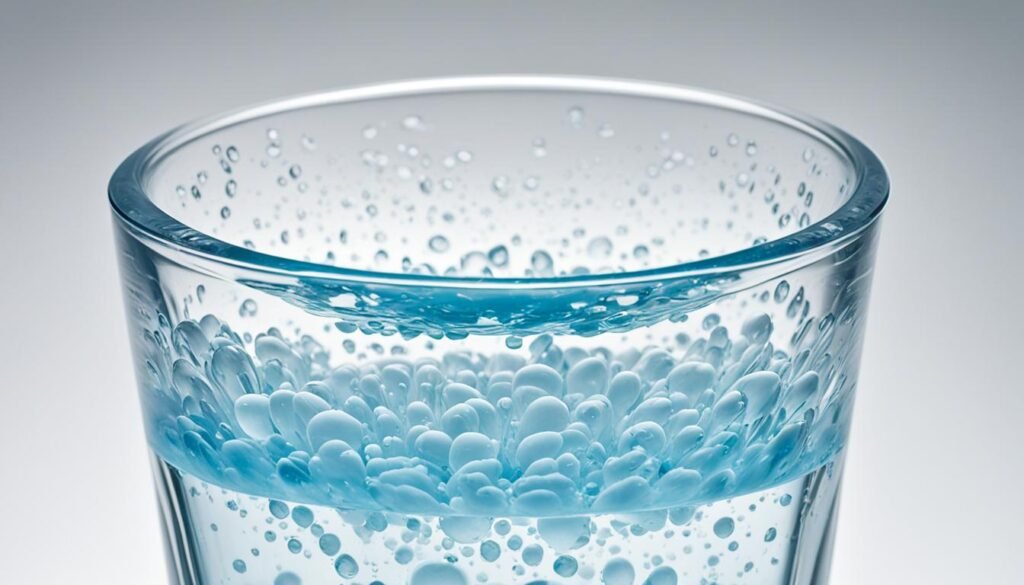
As someone deeply invested in my training regimen, I understand the importance of supplementing my diet with nutrients that can help enhance my performance. For women focused on weightlifting, finding the ideal women’s weightlifting supplements is crucial. When it comes to incorporating creatine—a supplement known for boosting strength and power—it’s essential to select a product that ensures efficacy and purity.
Why Creatine Monohydrate Stands Out for Women
Among the various forms of creatine available on the market, creatine monohydrate is often hailed as the superior choice, particularly for women. Its high bioavailability means that it’s more efficiently absorbed by the body, which is essential for maximizing the benefits while adhering to the recommended creatine dosage for females. The simple molecular structure of creatine monohydrate provides the stability needed to enhance its storage and uptake in muscle tissue.
Purity and Performance: Selecting High-Quality Creatine
When I look for a creatine for women, my top priority is purity. A high-quality supplement like Care/of’s single-ingredient creatine ensures that what I’m consuming is free from additional fillers or unnecessary compounds, which could detract from the desired outcomes. A pure creatine monohydrate product is preferable, as it mixes seamlessly with water or juice, a convenience for my daily routine without affecting the taste of my drinks.
Ultimately, the selection of a creatine supplement is more than just choosing a brand—it’s about making an informed decision that aligns with your fitness goals and dietary needs. By prioritizing quality and form, you can effectively incorporate creatine into your strength training regimen and start witnessing the results that come from dedicated and smart supplementation.
Common Misconceptions About Women and Creatine Use
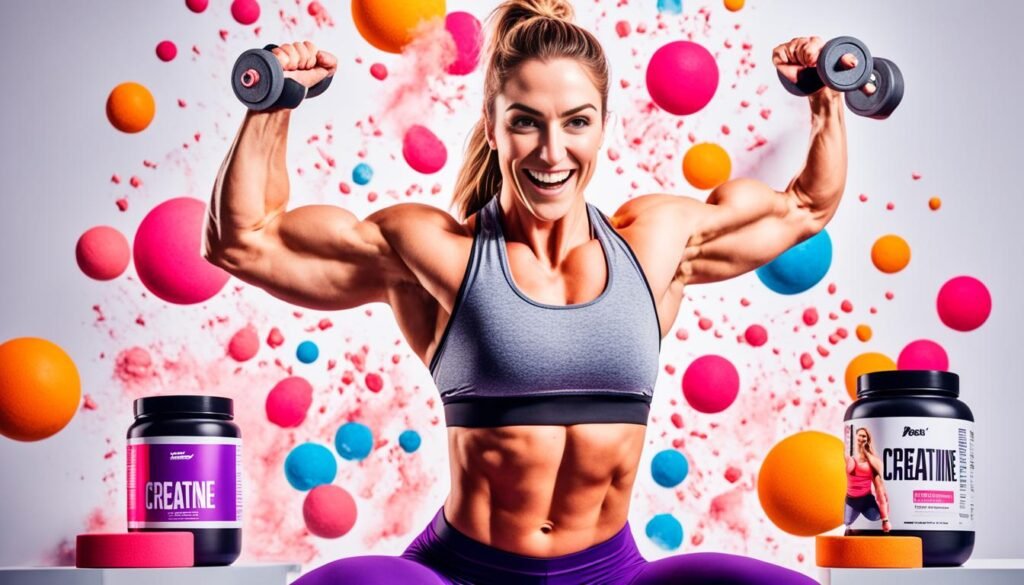
When considering Creatine for Women, there are several misconceptions that often cloud the true benefits it offers within Women’s Strength Training and Weightlifting for Women. It’s not uncommon to hear concerns about the fear of bulking up or even developing unease about bloating and water retention—fears that have, more often than not, turned women away from this powerful supplement. However, the realities are different from the myths.
Far from the bulky image often painted, creatine supplementation typically results in less water weight gain for women as compared to men. The majority of weight adjustments observed are closely tied to muscle gains rather than fat, which aligns perfectly with the goal of most female fitness enthusiasts—to build strength without excessive mass. Let’s unpack these widely held, yet unfounded, fears and shine a light on the real impact of creatine on female fitness.
- Myth: Creatine will make me too muscular and bulky.
- Fact: Creatine aids in muscle definition without excess size expansion.
- Myth: Consuming creatine causes uncomfortable bloating.
- Fact: Women generally experience minimal to no bloating.
- Myth: Creatine is unsafe for women’s health.
- Fact: Hundreds of studies endorse creatine’s safety and efficacy for both genders.
Rest assured, Creatine for Women is not just safe for consumption but is also an influential ally in achieving fitness goals, whether it be in Female Fitness, competitive sports, or Weightlifting for Women. It is time to leave behind the misinformation and embrace the potential of creatine in propelling women towards their strength training successes.
Creatine: Not Just for the Boys’ Club Anymore
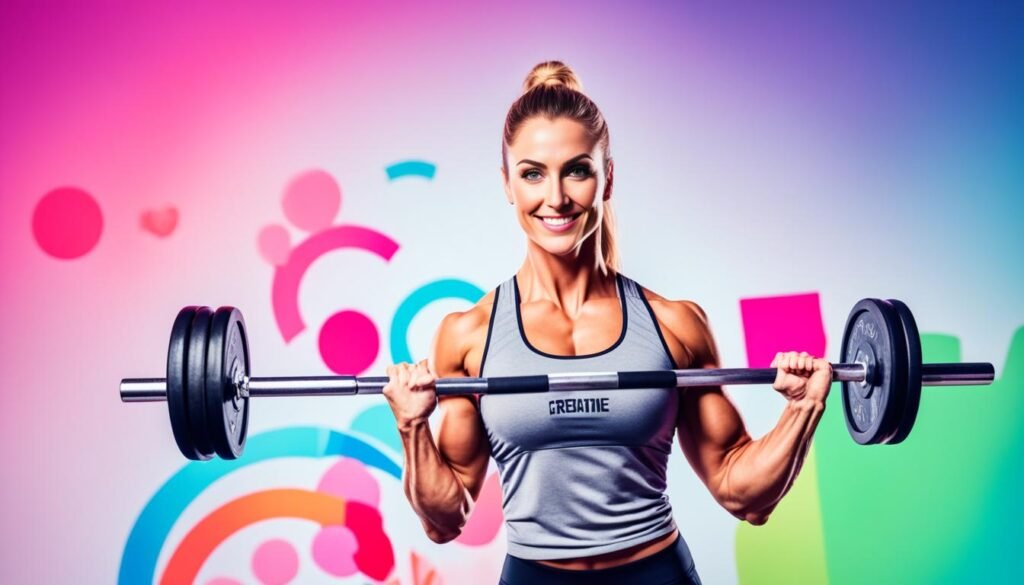
Long considered the stronghold of male bodybuilders, the realm of creatine use has opened its doors to empower female athletes across the board. These women are experiencing firsthand the transformative effects of Creatine for Women, shattering old-school misconceptions and embracing the strength benefits it offers. As a fitness enthusiast myself, I’ve witnessed this evolution and celebrate how Women’s Fitness and Creatine blend to craft powerful workout narratives in the world of Weightlifting for Women.
Broadening the View of Creatine Beyond Male Bodybuilding
The inclusion of creatine into a woman’s fitness regimen should not be considered an anomaly or an exception. Its ability to fuel workouts, increase muscle strength, and facilitate recovery is now a staple in achieving the goals of countless athletes. Gone are the days where myths of bulk and unwarranted mass overshadow its benefits.
Real Stories: Female Lifters on Their Creatine Journey
As we delve into the personal testimonies of women who’ve embraced creatine, the narrative shifts from skepticism to proof-positive. Through documented experiences and the tangible results witnessed in training, women across various age groups and fitness levels are offering up compelling insights into how creatine has bolstered their weightlifting pursuits.
| Age Group | Strength Improvement | Recovery Rate | Creatine Impact |
|---|---|---|---|
| 20-30 | Increased lifting capacity | Faster post-workout recovery | Enhanced workout performance |
| 31-40 | Consistent strength gains | Reduced muscle fatigue | Improved endurance |
| 41-50 | Greater muscle preservation | Improved injury resilience | Supports active aging |
| 51+ | Maintenance of muscle mass | Enhanced joint health | Contributes to bone density |
Creatine and Vegetarian Women in Weightlifting
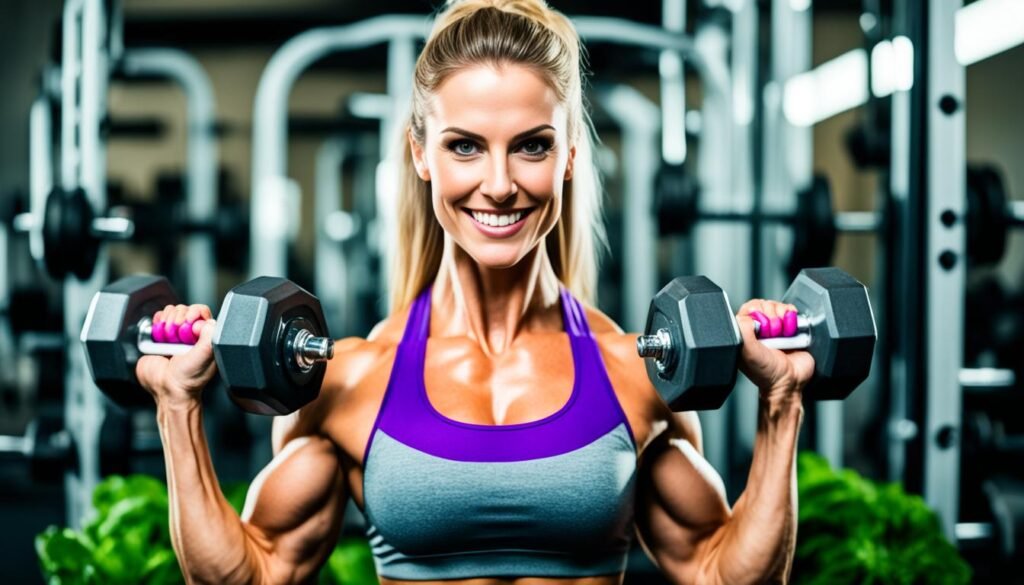
As I delve into the world of female fitness, I often encounter vegetarian and vegan athletes who express concerns about not getting enough creatine from their diets. For those of us committed to strength training, creatine isn’t just an optional boost; it’s a critical element of our muscle health and workout performance. Knowing the right creatine dosage for females is paramount, particularly when dietary sources are limited due to a plant-based lifestyle.
My exploration into creatine for women who follow a vegetarian or vegan diet led me to the conclusion that supplementation could be a game-changer. The distinction between naturally sourced creatine from meat and synthesized supplements is noteworthy as our bodies can’t tell the difference. Yet, the end benefits—enhanced muscle recovery, increased workout intensity, and improved overall strength—are universally significant.
I always advocate for personalized fitness plans, and here’s how creatine supplementation could specifically benefit women in weightlifting:
| Bioaspect | Without Creatine Supplementation | With Creatine Supplementation |
|---|---|---|
| Muscle Energy | Lower reserves may lead to quicker fatigue. | Increased phosphocreatine stores for sustained energy. |
| Strength Gains | May progress at a slower rate. | Potentially accelerated improvements in muscle strength. |
| Recovery Time | Longer recovery periods post-training. | Reduced muscle soreness and faster recovery. |
The consensus within the health and fitness community highlights that a creatine regimen can be especially advantageous for vegetarians. Regular intake, attuned to the demands of one’s training schedule and physical goals, lays the groundwork for making the most out of every workout, and ultimately, fostering an empowered and healthy physique in the realm of female fitness.
Creatine’s Unique Role in Women’s Aging and Fitness
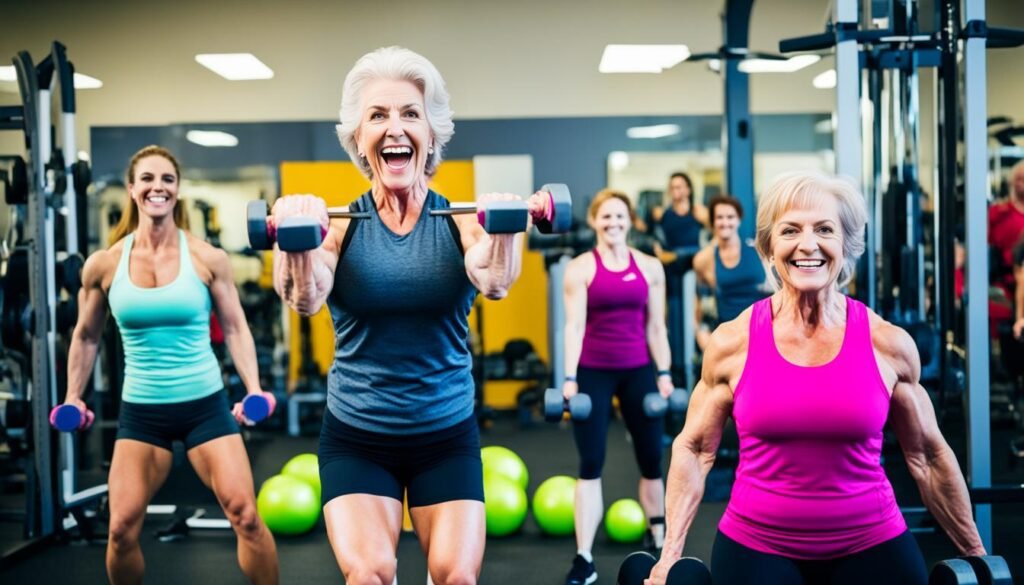
As an advocate for female fitness, I’ve noticed a significant shift in how women’s strength training is perceived, particularly for those in their golden years. There’s more to creatine than just aiding the performance of vibrant young athletes; it’s a powerful supplement for promoting health and well-being among postmenopausal women, too.
Postmenopausal Women and Creatine: A Synergistic Effect on Health
In my journey exploring the manifold creatine benefits, one thing stands out: its profound impact on postmenopausal women. Creatine isn’t merely a muscle booster; it’s emerging as a key ally against the age-related decline in muscle mass and bone density.
Skeletal Support and Muscle Mass Retention in Senior Female Athletes
As a weightlifting enthusiast, I’m particularly interested in how creatine supports senior female athletes. It goes beyond just aiding in performance — it’s about maintaining a quality of life that empowers these women to continue thriving.
| Muscle Health Factor | Benefit of Creatine Supplementation |
|---|---|
| Muscle Mass Retention | Supports the maintenance of lean muscle tissue |
| Bone Density | Helps improve bone strength and potentially reduce the risk of fractures |
| Physical Performance | Enhances strength and power during resistance training |
| Recovery | Facilitates faster recuperation between training sessions |
| Cognitive Function | May improve mental clarity and focus, which is vital for complex movements in weightlifting |
Confronting the Weight Gain Myth: Creatine’s Real Effects on the Female Body
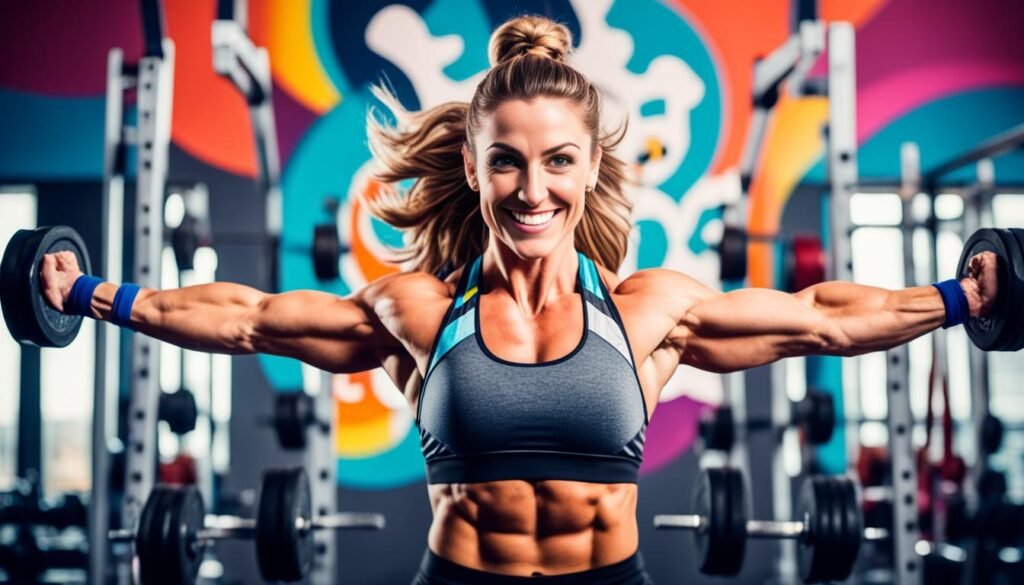
As a professional dedicated to Female Fitness and wellbeing, it’s crucial for me to address one of the most pervasive myths in the industry: the association of Creatine for Women with unwanted weight gain. Through education and evidence, it’s time to dispel this misconception and clarify the role of creatine in fostering optimal health and performance.
The narrative that creatine supplementation leads to excessive weight and fat gain is not just misleading; it undermines the potential benefits of this nutrient in Women’s Fitness and Creatine related regimens. In reality, creatine is known for its role in Creatine and Muscle Building, helping women to achieve a toned and lean physique without the addition of fat — as creatine itself is calorie-free.
When beginning supplementation, some individuals might notice a slight increase in water weight, but this is a temporary effect. Over time, this initial water retention typically subsides, especially as workout intensity increases—a critical balance achieved by many female athletes.
To illustrate the influence of creatine without the side effect of gaining unwanted weight, let’s consider its impact on muscle synthesis and overall body composition:
- Increased high-energy phosphocreatine stores enable more robust and sustained workout performances.
- This heightened performance facilitates greater muscle gains and supports a faster metabolic rate.
- Enhanced muscle gains from proper creatine supplementation contribute to a leaner body mass over time.
By maintaining a well-structured fitness program and adhering to nutritional best practices, the muscular benefits of creatine can readily outweigh any concerns over temporary changes in water weight.
In my journey to promote the full spectrum of health benefits available to those in the field of female fitness, it’s been my mission to encourage a more nuanced understanding of supplements like creatine. It’s a potent ally in the quest for strength, endurance, and overall vitality—for every woman with ambitions of muscle building and health optimization.
Conclusion
As we have explored the multifaceted roles and benefits of creatine in enhancing female fitness, it’s evident that incorporating this supplement into a weightlifting regimen can be a game-changer. My personal journey with creatine has taught me the importance of tailoring dosage and intake to align with my specific workout demands and health goals. With the advent of more tailored nutritional science, every woman’s approach to creatine usage can be as unique as her training program.
Personalizing Creatine Use for Your Fitness Regimen
Finding the right creatine dosage for females requires attention to detail and an understanding of one’s body responses to training. For me, consciously including it in my daily routine has meant enhancing not just my physical strength but also fortifying my mental resilience during grueling sessions. At the end of the day, the goal is not just to lift heavier but to ascend to a peak state of overall well-being.
The Takeaway for Women Weighing Creatine’s Pros and Cons
The narrative surrounding creatine in women’s fitness and creatine is evolving. With solid evidence dispelling rumors and enlightening the sporting community on the actual benefits, weightlifting for women has embraced a new ally. As a woman invested in my health and athletic performance, I can affirm that the inclusion of creatine supplements offers a substantial edge. It’s more than sheer power – it’s about sculpting a resilient, finely-tuned physique capable of surpassing barriers, often set by myth rather than merit.
FAQ
What is Creatine, and Why is it Relevant to Weightlifting?
Creatine is a naturally occurring amino acid that’s stored in muscles and used by the body to produce energy during high-intensity activities like weightlifting. It’s relevant to weightlifting because it helps enhance strength, increase muscle mass, and improve exercise performance, making it a valuable supplement for female athletes seeking to maximize their training outcomes.
Are there Natural Sources of Creatine, and Why Might Supplements be Necessary?
Natural sources of creatine include red meat, fish, and organ meats. However, vegetarians and those with dietary restrictions might not get enough creatine from their diet alone. Supplements can help maintain optimal levels in the body, particularly for women engaged in intense training or living on a plant-based diet.
How does Creatine Promote Lean Muscle Growth Without the Bulk?
Creatine aids in the development of lean muscle by increasing the body’s capacity to produce energy, thereby enhancing workout performance. This energy boost allows women to train harder and recover faster, contributing to muscle growth without necessarily adding bulk or fat.
How does Creatine Fuel Workouts for Greater Endurance?
Creatine helps regenerate ATP, the primary energy source used during short, intense exercise bouts. With more ATP available, muscles can perform at a higher intensity for longer periods, which is especially beneficial for activities like sprinting, lifting, and interval training, leading to improved endurance in women’s workouts.
Can Creatine Enhance Cognitive Function in Women?
Yes, creatine has been shown to support mental clarity by improving oxygen uptake in the brain. This cognitive advantage can be particularly useful during complex workouts or competitions where mental focus is as critical as physical strength.
What is the Recommended Creatine Dosage for Females?
While the ideal dosage can vary based on individual needs, studies suggest that taking 5 grams of creatine per day can significantly enhance muscle strength, power, and performance in women. However, starting with a smaller dose and adjusting as necessary based on personal response and goals is advisable.
How does Creatine Affect Muscle Recovery in Women?
Creatine supplementation has been linked to improved recovery by reducing muscle cell damage and inflammation after intense exercise. It can help female athletes return to their training quicker with reduced soreness and better overall performance.
Why is Creatine Monohydrate the Preferred Choice for Women?
Creatine monohydrate is widely regarded as the most effective form of creatine due to its high bioavailability, cost-effectiveness, and extensive research backing its performance benefits. It’s particularly well-suited for women who are focused on improving their strength and exercise capabilities while maintaining overall wellness.
How to Select High-Quality Creatine Supplements?
When choosing a creatine supplement, look for products that contain pure creatine monohydrate with no added fillers or artificial ingredients. Brands that utilize a closed production process, such as Care/of, ensure a high level of purity and quality, making them a reliable choice for female lifters.
What are Common Misconceptions About Women Using Creatine?
A prevalent misconception is that creatine makes women “bulk up” or gain excessive weight. In reality, creatine leads to lean muscle growth without increasing fat and any weight adjustments due to muscle gains typically do not include fat. Additionally, concerns about bloating or water retention tend to be overstated, as women generally experience less water weight gain compared to men.
How has the Perception of Creatine Use Shifted Among Female Athletes?
Creatine is no longer seen as just for male bodybuilders. Extensive research has validated its utility for strength gains and performance enhancement across genders. More female athletes are embracing creatine for its benefits in muscle development, recovery, and mental sharpness.
Why is Creatine Particularly Beneficial for Vegetarian Women Involved in Weightlifting?
Vegetarian women may have lower dietary creatine intake due to their plant-based eating habits. Supplementation with creatine can significantly enhance their performance in strength training and help maintain overall muscle health, addressing any potential dietary deficits.
How does Creatine Support Aging Women’s Fitness and Health?
Creatine can play a pivotal role in supporting bone density and muscle mass in postmenopausal women, contributing to improved physical function and quality of life. It can help retain strength and combat the natural loss of muscle and bone density that occur with age.
Can Personalizing Creatine Usage Enhance Overall Fitness Regimens for Women?
Absolutely, personalizing creatine intake based on individual exercise routines, goals, and dietary preferences is key to leveraging its full potential. Each woman can adjust her creatine dosage to align with her specific fitness ambitions and lifestyle needs, paving the way for optimal performance and health benefits.

